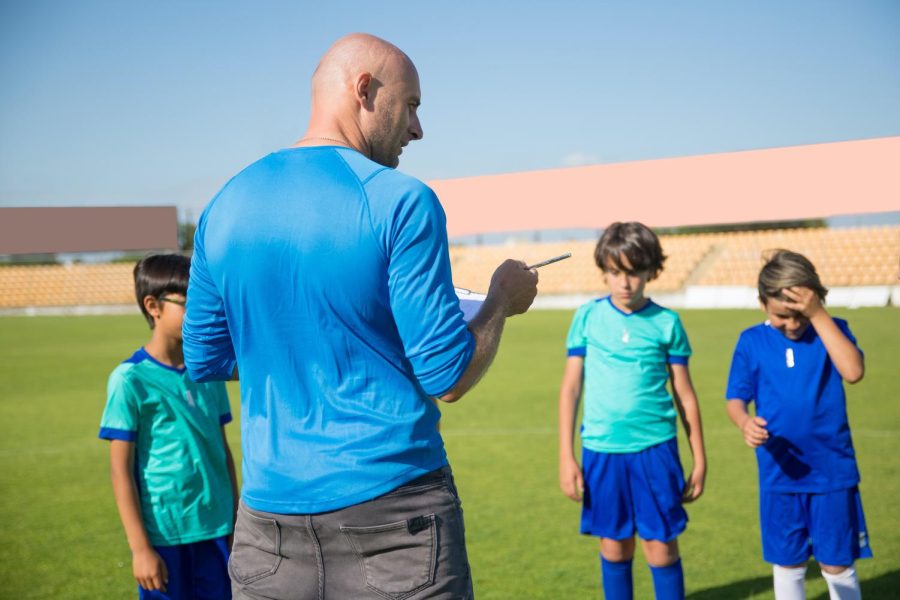When Coaching is the Real Issue
March 30, 2023
When people think of a coach, many will think of a kind and supportive mentor that helps people advance their athletic careers and grow as a person. Unfortunately, many are not like that. A bad coach can have very bad influences on athletes, this happens to everyone, amateur or professional athletes. Coaches can ruin sports for athletes.
A way that this happens is by pressuring an athlete to use an illegal substance like performance-enhancing steroids. This type of steroid helps build muscle tissue and body mass. Often they give these to athletes to make them better so they can win or be more competitive. In many cases, people have gotten caught and sacrificed something they worked their life for because someone else wanted them to be better.
Nadzeya Ostapchuk was a shot-putter from Belarus. She won the gold medal at the 2012 Olympics. Her coach, Alexander Yefimov, secretly dusted her food and coffee with an illegal steroid called metenolone. Metenolone is an anabolic steroid that prevents muscle wasting from diseases. Yefimov said he did it after unsuccessful training sessions. He was banned from the sport for four years. Since Ostapchuk didn’t know what he was doing with her food, she was only banned for a year. However, her medal was stripped after she failed two drug tests.
In a lot of sports, being very small and skinny is important for athletes. Sometimes the athletes are forced onto extreme diets and workout routines. This happens most often in sports like gymnastics, dance, and ice skating. In all of these sports, going through puberty is seen as a bad thing. Puberty usually changes girls’ bodies a lot; they gain weight, and height and build more fat.
Especially at the professional level, a large amount of figure skating coaches are known to force their athletes into extreme diets to look smaller or lose weight. A current example of this is Russian figure skating coach Eteri Tutberidize. She is known as a great coach but also as someone who pushes their athletes incredibly hard.
Recently, it has come out that she puts her skaters on strict diets and makes them train through injuries, which can cause an eating disorder and permanent injuries. In an interview with a Russian sports channel, a choreographer for Eteri named Daniil Gleikhengauz talked about skater Anna Shcherbakova saying that she could eat two shrimps and be full. In 2014, Eteri said that she was glad that Yulia Lipnitskaya could live only on powdered nutrients. The harsh coaching and extreme methods have ruined her diet and made her unhealthy.
Another example of coaching pressure in gymnastics is coach Bela Karolyi. He trained lots of successful gymnasts like Mary Lou Retton and Nadia Comăneci. However, he was obsessed with making the best gymnasts possible and would do anything to do it. Allegedly he starved athletes so much to the point where some of them started eating toothpaste and drinking toilet water. Karoyli also beat them and refused medical treatment.
Stejarel Olaru in his book, “Starving the gymnasts was a regular practice by the Karolyis,”… The girls ate toothpaste at night before going to bed — this is how hungry they were. In some cases, they talked about drinking water from the toilet tank in secret, because they were often not allowed to drink water.” He also had strong connections to Larry Nassar, a former team doctor who sexually abused around 265 gymnasts during his career.
Competitiveness is what drives a lot of athletes to success. Most of the time, people who are coaching a sport used to play that sport. They might have had some sort of disappointment in the sport and could make it so they become more strict and overbearing with the people they are coaching. People can become obsessed with winning, which could lead them to verbally and physically abuse their athletes. This can cause someone to lose their confidence and hate a sport they used to love.
Verbally abusive coaches are popular on the youth and amateur sports levels. The athletes are younger and probably won’t stand up for themselves and coaches know that they can take advantage of that. In an article in Sport Psychology Today, A 16-year-old said, “Going into high school I was a standout athlete with high confidence but after my freshman year I started to lose interest. It just wasn’t fun anymore. I hated practice because I was always worrying about messing up and being embarrassed by the coach.” He was so scared of his coach that he started to hate a sport he used to be passionate about. Similar situations happen to people all over the world, causing them to quit.
Coaches can ruin athletes’ careers and hold them back from reaching their true potential. Athletes in all different sports and all different ages have felt the effects of this in different ways. Adults shouldn’t ruin a sport for someone they have authority over, they should be supportive and help their careers grow in positive ways.

